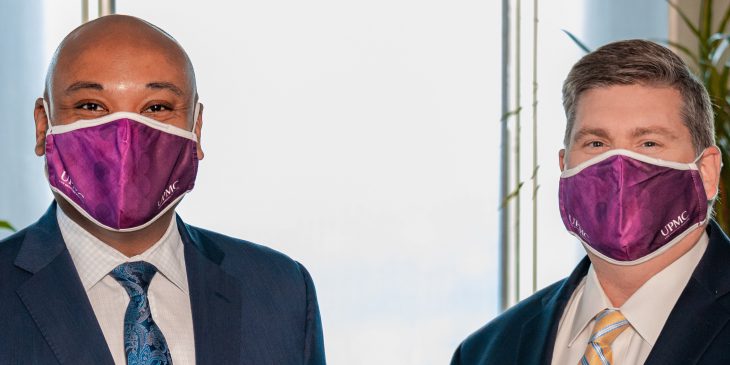James E. Taylor Ph.D., UPMC’s chief diversity, inclusion and talent management officer, and John Galley, UPMC senior vice president and chief human resources officer participated in the C-Suite Leadership and Diversity Symposium discussion at this year’s Diversity MBA National Virtual Elite Business Leaders Conference.
The UPMC leaders joined other corporate executives from wide-ranging businesses in an open discussion about blending inclusive leadership while maintaining business relevance in changing times brought on civil unrest and the COVID-19 pandemic.
“As a non-profit, the core of UPMC’s mission is to care for others, and for one another. We have been engaged in our communities since our inception…[taking] care of the underserved communities— we provide that. Last year, for example, we provided 1.4 billion in services to the community,” explained Galley during the discussion.
“We did have to change our operations very much during COVID-19. One of the big things was the fear that started initially. We have nurses, doctors and others on the front lines who are caring for people and it was a scary time for them. We didn’t know much about the virus in March when it landed on our shores,” he added.
“Fundamentally, what we did was take care of people. We made sure we had personal protective equipment; we made sure that people were trained and educated about how to prevent the spread of this disease; we had the finest doctors working to cure, and to help people recover from the disease. We took care of each other, and we created new policies to protect our staff to ensure that our work force would remain vibrant and didn’t have the infection running through them,” Galley said.
Taylor provided insight on the ways diversity and health care intersect at UPMC, highlighting the health system’s crucial role in addressing health disparities.
“The nature of our work in this industry is around care delivery. Our customers are our patients, and our [health plan] members, and how we go about best linking culture to health care outcomes, to in-turn study health disparities, was really illustrated during COVID,” explained Taylor.
“We heard the national narrative of health disparities in various metropolitan cities across the country. Our clinical experts and leaders, on a daily basis, look at our own data within our hospitals to track—for example, testing by demographic. Who’s getting tested and who isn’t and how does that align with the demographic throughout our community. Testing is about access, and so looking at the rate of positives, [we evaluate] who from these demographics is testing positive from this disease.”
“We played a really critical role in simply educating and informing our community,” said Taylor. “Certainly, in March there was much that was unknown, still today there are a number of aspects of this disease and this virus that are still unknown. We share data and facts with our communities to make certain that they understand nuances, how the disease is transmitted, proper mask wearing techniques and various safety protocols to make our communities as safer place to reside.”
While addressing race relations, Taylor noted the importance of having difficult conversations in the workplace, stressing the need for action as a follow up to dialogue.
“It is unprecedented to lead diversity efforts in a corporate space, especially in healthcare. It continues to evolve by way of courageous conversations we’ve engaged in at UPMC,” said Taylor. “The ability to have these conversations is extremely important, but having these talks with no follow up or action is a lost mission. How you go about leveraging these conversations to create sustainable progress is what’s most important about this moment.”
“We all came together around COVID-19 and around the social unrest, and horrible tragedies of George Floyd, Breonna Taylor and others, and we listened to each other and talked to each other so we could pivot to action,” explained Galley.
UPMC has topped the ranks of the Diversity MBA list of “50 Out Front: Best Places to Work for Women & Diverse Managers” for the past two years. To learn more about diversity and inclusion efforts at UPMC, visit the UPMC Center for Engagement and Inclusion.









